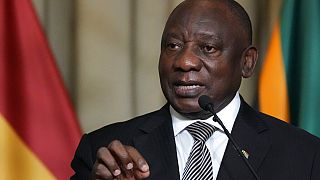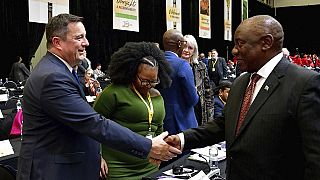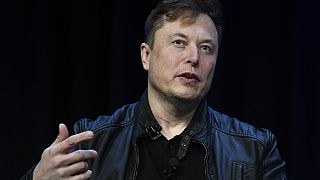South Africa
Will South African MPs vote to proceed or not with an enquiry by an impeachment committee looking into allegations levelled against President Ramaphosa? They convened an extraordinary session on Tuesday (Dec. 13).
An extraordinary parliamentary session opened in Cape Town to discuss the findings of an independent panel which says President Cyril Ramaphosa may be guilty of serious violations and misconduct over allegations he concealed a huge cash theft at his farm.
The speaker of the National Assembly, Nosiviwe Mapisa-Nqakula, say during the session opening that it will be up to members "to proceed or not to proceed with an enquiry by an impeachment committee of the Assembly."
Ramaphosa -- championed as a graft-busting saviour after corruption-stained predecessor Jacob Zuma -- is counting on support from the ruling African National Congress (ANC) party, which has been further divided by the scandal.
Lawmakers are called to decide in an open vote, by simple majority, whether to launch an impeachment investigation against Ramaphosa -- a lengthy probe that could lead to his removal from office.
The 70-year-old president seems likely to survive the day, although analysts predicted the debate could be long and bitter.
Last week, he secured the renewed backing of the ANC, which holds 230 of the National Assembly's 400 seats, after mounting a legal bid to have the damning report annulled.
"We are going to use our numbers as ANC... because we cannot be dictated to by a panel that has not been objective," Communications Minister Khumbudzo Ntshavheni told reporters before entering parliament.
Toe the line?
Political analyst Ongama Mtimka from the Nelson Mandela University predicted ANC MPs would toe the party line ahead of a crunch meeting this Friday (Dec. 16), when they hold a five-yearly conference to elect new leaders.
The ANC conference "presents the members with a chance to make a change at a party level, where it matters the most," said Mtimka.
Yet others believe there might be room for surprises, as the scandal has deepened rifts within the deeply factionalised ANC.
Its national executive vowed last week to vote down any attempt to force Ramaphosa from office.
That decision upset some, who said the executive had forced their hand.
Ramaphosa's graft-tainted predecessor Zuma survived several no-confidence motions during his tenure before his own party forced him to resign in 2018.
Opposition parties are presenting a largely united front on the issue.
John Steenhuisen, leader of the largest opposition party, the Democratic Alliance, said the ANC cannot be allowed to use "the tyranny of their majority to protect a president from scrutiny".
It is likely to be "a very heated and long procedure," said analyst Daniel Silke.
Scrutiny
Ramaphosa, who will not be in parliament on Tuesday, kicked off his day in the capital Pretoria, presiding under pouring rain at a police graduation ceremony.
Were the opposition to have its way, Ramaphosa would face the prospect of having the affair further scrutinised by parliament in a year that leads to general elections in 2024.
An impeachment vote itself would need the support of a two-thirds majority of MPs to succeed.
The president, who was a wealthy businessman before entering politics, found himself in hot water in June when South Africa's former spy boss filed a complaint against him to the police.
Arthur Fraser alleged Ramaphosa had concealed the theft of several million dollars from his luxury farm in 2020.
He accused the president of having the burglars kidnapped and bribed into silence instead of reporting the matter to the authorities.
A police inquiry is ongoing. Ramaphosa has not been charged with any crime and has denied wrongdoing.
The findings of the three-person special probe, issued last week, brought forward details that have left South Africa agog.
Ramaphosa acknowledged the theft that was stashed under sofa cushions at his farm -- a safer place, his employees said than the office safely.
He said the money was payment for buffaloes bought by a Sudanese businessman, who allegedly confirmed the transaction in interviews with British media.
The huge amount of greenback cash has raised questions about the declaration of foreign currency and tax concerns.











01:04
South Africa: ANC partner quits key govt initiative as new spat hits coalition
Go to video
African gut study reveals urbanization threatens microbial diversity
01:35
Edgar Lungu's family condemns court decision to stop private burial in South Africa
00:52
South African court halts burial of Zambia’s ex-president Edgar Lungu
01:54
South Africa's independent mechanics join forces to compete with big companies